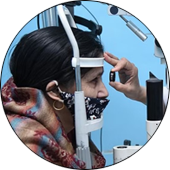- Email: Sushil_60@yahoo.com
- 4/15, sector -5, rajendra nagar
- Call: +91 98100 32030
Heart Disease

20
Years of Experience in This Field
The Great Place Of New Vision Eye and Medical Care. Best Eye Care Clinic in Ghaziabad.
"The Great Place Of New Vision Eye and Medical Care" is the premier Eye Care Clinic in Ghaziabad, dedicated to providing top-notch medical and eye care services to the community. Our mission is to offer comprehensive, compassionate, and state-of-the-art eye care to improve the vision and overall well-being of our patients.
Our Mission
- High-quality work
- Innovation and Research
- Rapid response times
Our Vision
- Best Price
- Best Treatment
- Emergency solutions
What Causes Heart Disease?
Heart disease, also known as cardiovascular disease, refers to a group of conditions that
affect the heart and blood vessels. There isn't a single cause of heart disease; instead, it
typically develops due to a combination of various risk factors and underlying processes.
The primary causes and risk factors for heart disease include:
1. Atherosclerosis: Atherosclerosis is the buildup of plaque (composed of cholesterol,
fat, calcium, and other substances) in the arteries, which narrows and hardens them. This
restricts blood flow and can lead to various forms of heart disease, including coronary
artery disease.
2. High Blood Pressure (Hypertension): Hypertension puts extra stress on the heart and blood vessels, leading to damage and increasing the risk of heart disease.
3. High Cholesterol: Elevated levels of LDL (low-density lipoprotein) cholesterol, often referred to as "bad" cholesterol, can contribute to the development of atherosclerosis. Lower levels of HDL (high-density lipoprotein) cholesterol, known as "good" cholesterol, can also be a risk factor.
4. Smoking: Smoking is a major risk factor for heart disease. It damages the blood vessels, reduces oxygen in the blood, and increases the risk of blood clots.

5. Diabetes: Uncontrolled diabetes can damage blood vessels and nerves, increasing the risk of heart disease.
6. Obesity: Excess body weight, especially around the abdomen, is associated with various risk factors for heart disease, including high blood pressure, high cholesterol, and diabetes.
7. Physical Inactivity: A sedentary lifestyle can contribute to obesity and increase the risk of heart disease.
8. Family History: A family history of heart disease can increase your risk, as it may indicate a genetic predisposition to the condition.
9. Age: The risk of heart disease increases with age, particularly for men over 45 and women over 55.
10.Gender: Men tend to be at a higher risk of heart disease than premenopausal women. However, the risk increases for women after menopause.
11.Stress: Chronic stress can contribute to heart disease by promoting unhealthy habits like overeating, smoking, or excessive alcohol consumption.
12.Poor Diet: A diet high in saturated and trans fats, salt, and sugar can contribute to high cholesterol, high blood pressure, and obesity, all of which are risk factors for heart disease.
13.Excessive Alcohol Consumption: Drinking too much alcohol can raise blood pressure, contribute to obesity, and lead to other heart disease risk factors.
14.Inflammation: Chronic inflammation within the body, often linked to conditions like rheumatoid arthritis, can increase the risk of heart disease.
15.Sleep Apnea: This condition, characterized by interrupted breathing during sleep, is associated with an increased risk of heart disease.
it's important to note that many of these risk factors are interrelated. For example, obesity can lead to high blood pressure, high cholesterol, and diabetes. Addressing these risk factors through a healthy lifestyle, medication when necessary, and regular medical check-ups can help reduce the risk of heart disease. Consulting with a healthcare professional is essential to assess your specific risk and develop a personalized plan for prevention and management.
A Global Leader, Treatment
of eye Disease

Heart Disease
Heart disease, also known as cardiovascular disease, refers to a group of conditions that affect the heart and blood vessels. It can encompass various disorders such as coronary artery disease, heart failure, arrhythmias, and valvular diseases.

Pediatric Ophthalmology
Pediatric ophthalmology is a medical specialty focused on the diagnosis and treatment of eye and vision problems in children, from infancy to adolescence.

Lenses Transitions
Transition lenses are a type of eyeglass lens that automatically adjusts their tint in response to changing light conditions. They darken when exposed to UV light and become clear indoors.
How it Helps You to
Keep Healthy

Get Appointment
+91 98100 32030

Start Check-Up
Begin Your Journey to Better Health Today: Start Your Check-Up!

Enjoy Healthy Life
Embrace Wellness: Enjoy a Healthier Life!

